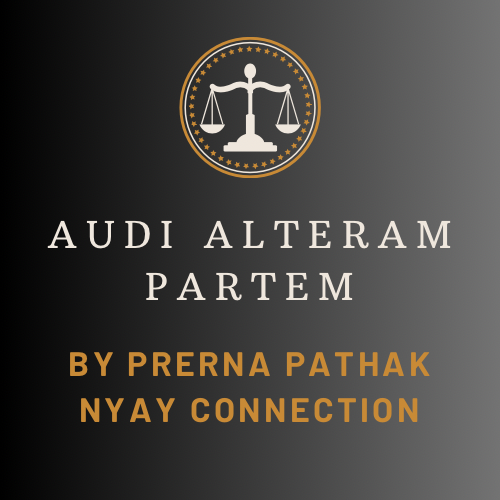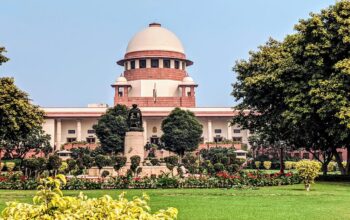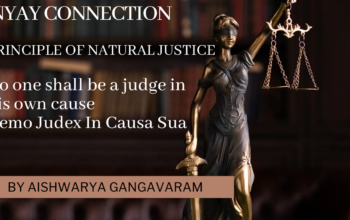Whenever a dispute arises, it is a common practice that the decision-makers give both parties to the conflict a fair opportunity to express their point of view to defend themselves, in other words, an equal opportunity to be heard so that the consequent decision is just, fair, reasonable, unbiased, and unarbitrary. This practice of giving a chance to be heard or Audi Alteram Partem is one of the cardinal principles of natural justice.
In India, the traces of Natural Justice can be traced back to Kautllya’s Arthashastra. Further, the principle of natural justice is embedded in the Constitution of India and forms the basis of Article 14 which guarantees equality before the law and equal protection of the law, and Article 21 which guarantees the right to life. In the landmark case of Maneka Gandhi v. Union of India AIR 1978 SC 597, it was held that the law and procedure must be fair, just, and reasonable. The Apex Court interlinked Articles 14, 19, and 21 of the Constitution and consolidated these provisions into a single entity, and any procedure has to meet the set criteria, thus liberally enlarging the scope of natural justice.
In this article, we shall discuss the principle of Audi Alteram Partem which as discussed earliest essentially means that no one shall be judged or punished without being given a fair chance to be heard. A man cannot incur the loss of property or liberty for an offense by a judicial proceeding,unless he gets a fair chance to respond to the charges brought against him. Earlier, the opportunity of being heard was limited as a basic requirement of court proceedings but later, it has been extended to decisions by quasi-judicial authorities, tribunals, and even administrative action.
In the case of Erusian Equipment & Chemicals Ltd vs State of West Bengal & Anr 1975 AIR 266 where all executive engineers were blacklisted without being given a chance to be heard because the government had information that they were indulging in some malpractices. The court held that this action was against the principles of natural justice and that no such decision can be taken unless a fair opportunity of being heard is provided.
COMPONENTS OF FAIR HEARING:
- Issuance of Notice-
It is a sine qua non to this principle that the parties to the dispute are given a valid and proper notice before any action is taken against them. Every party to the suit is entitled to know the facts of the case in order to defend any claims against them. A notice must include the time, place, and date of the hearing, the jurisdiction in which the case is filed, the charges, and the proposed action against the person.
If any order is passed without issuing proper notice, it is void ab initio. In J. B. Parikh v. University of Bombay, AIR 1987 Bom 332 wherein an action was taken against a student (Jayesh Bhupatri Parikh) accused of cheating based on the similarity of answers with another student (Milan Parikh) without any proper notice was held to be in violation of natural justice.
- Hearing
Any action taken by an authority without giving a reasonable opportunity for a fair hearing is invalid and can be set aside. A fair hearing is one where the parties are informed of the charges against them, have the right to know the evidence, have the witnesses examined in their presence, etc. In the landmark case of Maneka Gandhi v. Union of India (supra) where the passport of Menka Gandhi was impounded under Section 10(3)(c) of the Passport Act in public interest. No explanation was provided for such action by the Ministry of External Affairs and consequently, she filed a write under Article 32 of the Constitution of India contending that her right to life under Article 21 was violated.
The Supreme court held that in extraordinary situations where immediate action is required and it is impossible to provide prior notice of hearing to be followed by a full remedial hearing, a post-decisional hearing shall be held to protect the right of a fair hearing of the people, even though at a later stage.
RIGHT TO KNOW THE EVIDENCE AND THE RIGHT TO CROSS EXAMINATION:
A fair hearing mandates that all evidence facts and documents should be fully disclosed so that the parties to the dispute are aware of the materials on which the authority will decide. Evidence supporting the claims of the parties to the suit must be brought before the adjudicating authority and the decision given by the latter must be based on the evidence adduced. The parties have the right to know the evidence, both oral and documentary, on which the case is proposed to be determined, as well as the right to have witnesses examined in his presence, cross-examine them, and lead his own evidence, both oral and documentary, in his defense.
A fair chance to rebut any claims made against a party is crucial i.e. cross-examination. However, in Ludhiana Food Products vs Collector Of C. Ex. 990 (47) ELT 294 Tri Del the court held that if the party voluntarily waives the right to cross-examine the witness, the principle of natural justice shall not be violated.
RIGHT TO LEGAL REPRESENTATION:
Another component of a fair hearing is the right of the parties to be represented by a lawyer of their choice. In M.H Hoskot vs State of Maharashtra 1978 AIR 1548, the Supreme court held that free legal aid at the cost of the state to the accused who cannot afford legal representation is a fundamental right under Article 21 of the Constitution as a part of fair, just and reasonable procedure.
The right to be represented by a lawyer in administrative procedures is not typically regarded as a significant aspect of natural justice and cannot be claimed as a matter of right mandated statutorily.
EXCEPTIONS:
The rule of audi alteram partem is held inapplicable in the following circumstances-
- Statutory Exclusion
- Legislative Function
- Interdisciplinary actions
- Impracticability
- Academic Evolution
Therefore, the right to a fair hearing is one that cannot be dispensed with if one must ensure that the principle of natural justice is upheld. One must always be given a chance to defend any claims made against him to ensure a fair and just decision. However, it is pertinent to note that the principles of natural justice are flexible and dynamic in nature and vary in accordance with the facts and circumstances of each case, no straight-jacket formula can be applied.
This article is written by Prerna Pathak. Prerna is pursuing her L.L.M. from Jamia Millia Islamia.
If you are a law student or professional and want to contribute to this website, send your your submission at nyayconnection@gmail.com.




